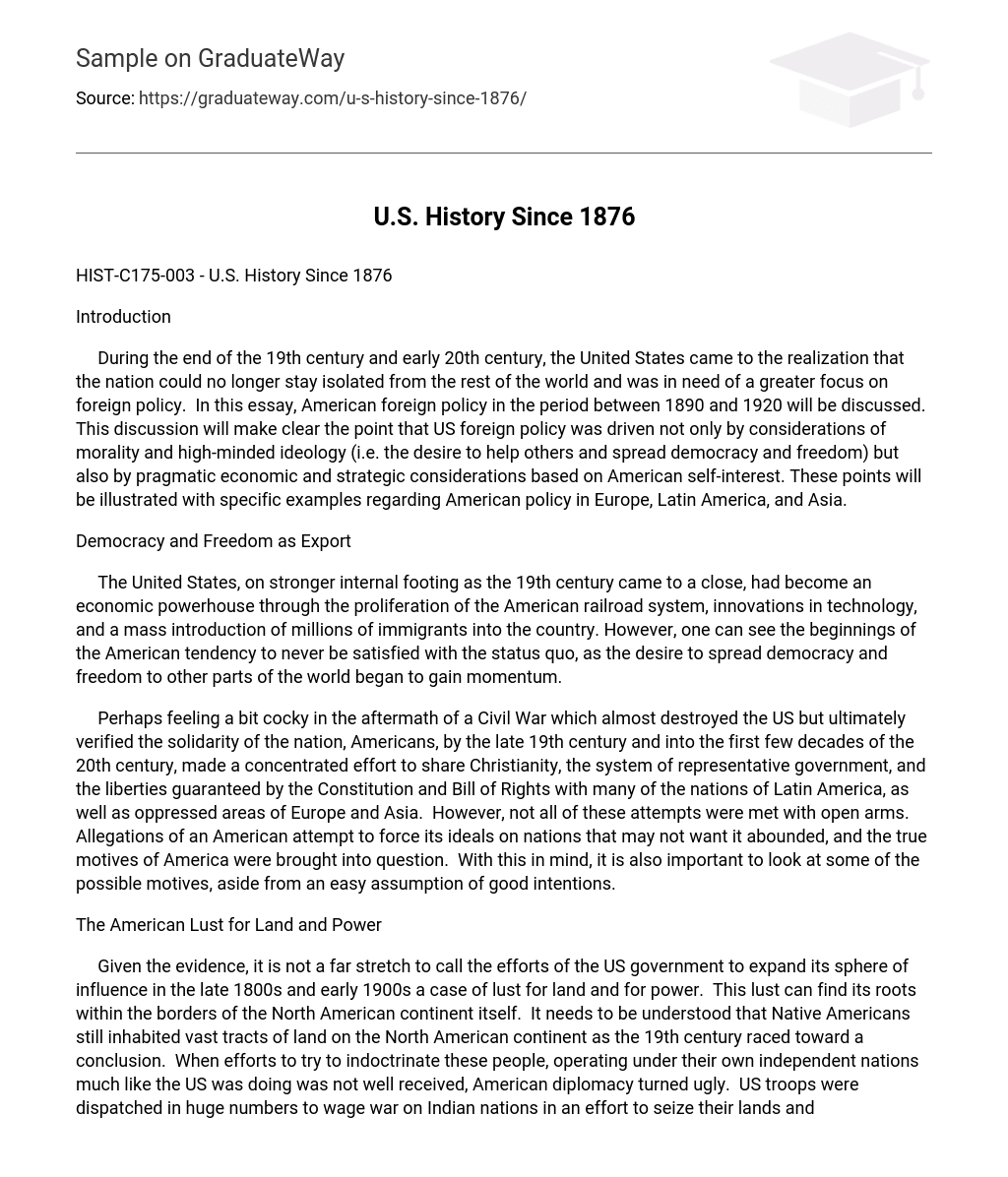During the end of the 19th century and early 20th century, the United States came to the realization that the nation could no longer stay isolated from the rest of the world and was in need of a greater focus on foreign policy. In this essay, American foreign policy in the period between 1890 and 1920 will be discussed. This discussion will make clear the point that US foreign policy was driven not only by considerations of morality and high-minded ideology (i.e. the desire to help others and spread democracy and freedom) but also by pragmatic economic and strategic considerations based on American self-interest. These points will be illustrated with specific examples regarding American policy in Europe, Latin America, and Asia.
Democracy and Freedom as Export
The United States, on stronger internal footing as the 19th century came to a close, had become an economic powerhouse through the proliferation of the American railroad system, innovations in technology, and a mass introduction of millions of immigrants into the country. However, one can see the beginnings of the American tendency to never be satisfied with the status quo, as the desire to spread democracy and freedom to other parts of the world began to gain momentum.
Perhaps feeling a bit cocky in the aftermath of a Civil War which almost destroyed the US but ultimately verified the solidarity of the nation, Americans, by the late 19th century and into the first few decades of the 20th century, made a concentrated effort to share Christianity, the system of representative government, and the liberties guaranteed by the Constitution and Bill of Rights with many of the nations of Latin America, as well as oppressed areas of Europe and Asia. However, not all of these attempts were met with open arms. Allegations of an American attempt to force its ideals on nations that may not want it abounded, and the true motives of America were brought into question. With this in mind, it is also important to look at some of the possible motives, aside from an easy assumption of good intentions.
The American Lust for Land and Power
Given the evidence, it is not a far stretch to call the efforts of the US government to expand its sphere of influence in the late 1800s and early 1900s a case of lust for land and for power. This lust can find its roots within the borders of the North American continent itself. It needs to be understood that Native Americans still inhabited vast tracts of land on the North American continent as the 19th century raced toward a conclusion. When efforts to try to indoctrinate these people, operating under their own independent nations much like the US was doing was not well received, American diplomacy turned ugly. US troops were dispatched in huge numbers to wage war on Indian nations in an effort to seize their lands and wealth, and also to convert the massive numbers of people in these sovereign nations to the American way of life. In the process, much blood was spilled on both sides but ultimately, what was seen was the dissolution of the Native American nations and their absorption into the territory of the US. This activity had its roots in earlier American policies and actions, such as the promotion of Manifest Destiny in years prior to the end of the 19th century and even earlier, such actions as President Thomas Jefferson’s Louisiana Purchase in the early 1800s, which essentially increased the size of the United States by nearly 25% and fueled the fire of US expansion, coming to an peak as the 1800s moved toward the 1900s.
Internationally, an excellent example the American appetite for the spread of democracy and freedom by the end of the 19th century is also seen in the Spanish-American War. This conflict erupted because of the presence of Spanish forces in Cuba, who by this time had tortured and killed thousands of Cuban civilians in an effort to hold onto control of the island nation. As such, President William McKinley saw the situation as an American moral obligation to step in and protect the people of Cuba, while spreading democracy and freedom at the same time. After winning that war, the US, emboldened by the experience, eventually gained control of the Philippine Islands, representing a stronghold for democracy in the eastern portion of the globe. This presence would in time lead to conflicts with China and later Japan, provoking Japan into attacking American forces at Pearl Harbor, Hawaii in 1941, sparking the beginning of World War II for the US.
Conclusion
Overall, what is seen in the American distribution of democracy and freedom is a classic case of means not always justifying ends. Even with the best of intentions on the part of the US, the actions that have been taken in the past to “free” people and “help” them are often questionable. Therefore, in conclusion, what needs to be understood is that with great power, there is also great responsibility. As America finds itself today in the midst of challenges to freedom and power, the people and government as well would be well advised to remember this timeless lesson of history.





